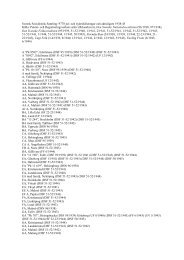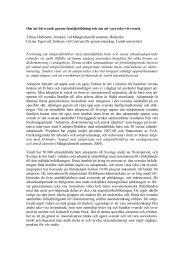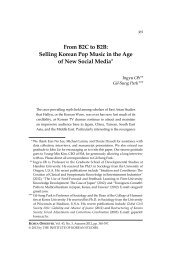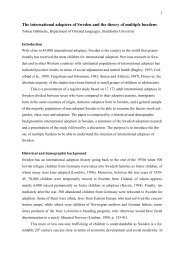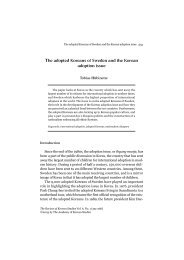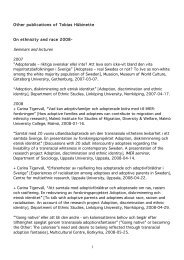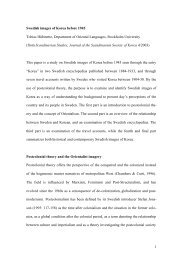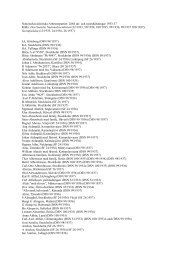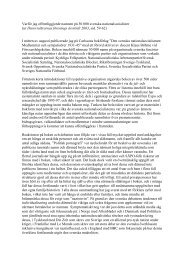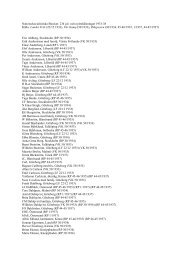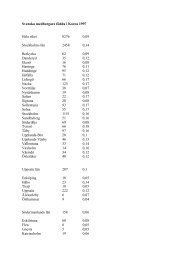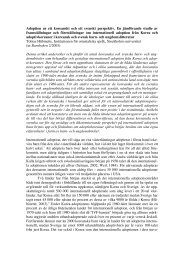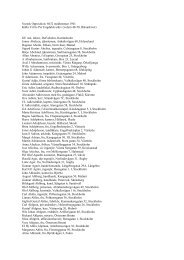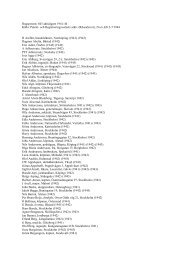Histoire de l'adoption coréenne Tobias Hübinette (Eleana Kim, éd ...
Histoire de l'adoption coréenne Tobias Hübinette (Eleana Kim, éd ...
Histoire de l'adoption coréenne Tobias Hübinette (Eleana Kim, éd ...
You also want an ePaper? Increase the reach of your titles
YUMPU automatically turns print PDFs into web optimized ePapers that Google loves.
quoiqu’en très petit nombre (Wolgan Chosun, 7/1/02). En janvier 2002, <strong>de</strong>ux enfants orphelins nordcoréens<br />
qui, avec <strong>de</strong>s milliers d'autres enfants sans parents, avaient traversé la Mandchourievia la frontière<br />
du fleuve Tuman en quête <strong>de</strong> nourriture, ont reçu l'asile en Corée du Sud, et dans le débat qui a suivi, le<br />
missionnaire américain Tim Peters a déclaré dans une interview:<br />
« Je pense que <strong>l'adoption</strong> est une excellente solution. Vous vous souvenez peut-être que <strong>de</strong> nombreux<br />
enfants orphelins sud-coréens ont été adoptés par <strong>de</strong>s familles <strong>de</strong> l'Ouest après la guerre <strong>de</strong> Corée. Il est<br />
temps pour les Sud-Coréens <strong>de</strong> faire <strong>de</strong> même. » (Korea Times, 18/3/02).<br />
L'adoption internationale se poursuit, après plus d'un <strong>de</strong>mi-siècle. L'adoption internationale est trop<br />
souvent utilisée pour se débarrasser <strong>de</strong>s enfants onéreux et « impurs », stigmatisés par l'illégitimité<br />
(sasaenga), par le handicap (changae'a) ou par la race (honhyôla). Les enfants métis sont revenus<br />
ironiquement une catégorie d'adoption, cette fois engendrés par les travailleurs immigrés venus <strong>de</strong> l'Asie<br />
du Sud ou du Sud-Est et par conséquent appelés les enfants Kosian. Il n’est pas surprenant que le Haut<br />
Commissariat aux droits <strong>de</strong> l'homme <strong>de</strong>s Nations unies ait également critiqué à plusieurs reprises la Corée<br />
pour ne pas appliquer <strong>de</strong>s mesures visant à lutter contre la discrimination sexuelle, sociale ou raciale,<br />
tandis que son Comité <strong>de</strong>s droits <strong>de</strong> l'enfant exprime sa préoccupation pour la continuation <strong>de</strong> <strong>l'adoption</strong><br />
internationale en provenance d’un pays ayant la 12 e plus gran<strong>de</strong> économie mondiale (Comité <strong>de</strong>s droits <strong>de</strong><br />
l'enfant, 2003).<br />
Références<br />
Ahlan<strong>de</strong>r, Dag S. 1976. «Sverige i värl<strong>de</strong>n» [La Suè<strong>de</strong> dans le mon<strong>de</strong>]. Dans Sverige sett utifrån.<br />
Reflexioner från några svenskar i utrikestjänst [Suè<strong>de</strong> vue <strong>de</strong> l'extérieur. Réflexions d'un groupe <strong>de</strong><br />
Su<strong>éd</strong>ois dans le service <strong>de</strong>s affaires étrangères], 3-40. Stockholm: Secretary for Future Studies.<br />
Alvernaz, Rose et Helen Tieszen. 1958. «Technical assistance for child welfare in Korea». Children 5 (4):<br />
134-139.<br />
Anthony, Joseph. 1960. The rascal and the pilgrim. The story of the boy from Korea. New York: Farrar,<br />
Straus and Cudahy.<br />
Back, Tae Hyeon. 2001. «The social reality faced by ethnic Koreans in Central Asia». Korean and Korean<br />
American Studies Bulletin 12 (2-3): 45-88.<br />
Baik, Yeonoak et Jin Young Chung. 1996. «Family policy in Korea». Journal of Family and Economic<br />
Issues 17 (1): 93-112.<br />
Benet, Mary Kathleen. 1976. The politics of adoption. New York: The Free Press.<br />
Bowman, LeRoy, Benjamin A. Gjenvick, et Eleanor T.M. Harvey. 1961. Children of tragedy. Church<br />
World Service survey team report on intercountry orphan adoption. New York: Church World Service.<br />
Breckenridge, Lee. 1977. «Non-recognition of foreign abandonment <strong>de</strong>crees in United States adoption<br />
proceedings». Harvard International Law Journal 18 (1): 137-150.<br />
Chakerian, Charles G. 1962. Concern, responsibility, opportunity. First report on Korea. New York:<br />
Church World Service.<br />
—1963. The changing scene. Second report on Korea. New York: Church World Service.<br />
—1968. From rescue to child welfare. New York: Church World Service.<br />
Chang, Edward Taehan. 2000. «Korean kaleidoscope: An overview of Korean immigration to the U.S.»<br />
Korean and Korean American Studies Bulletin 11 (2): 5-20.<br />
Chang, Pilwha. 1996. «A feminist view of social policy in some East Asian countries». Asian Journal of<br />
Women’s Studies 2 (1): 7-37.<br />
Cho, Hyoung. 1997. «Fertility control, reproductive rights, and women’s empowerment in Korea». Asian<br />
Journal of Women’s Studies 3 (1): 103-132.<br />
Ch’oe, Wôn-kyu. 1996. Oeguk’minganwônjodanch’êûi hwaldongwoa hanguksahoe-saôb paljônê mich’in<br />
yônghyang [Activités <strong>de</strong>s organismes bénévoles étrangers et leurs influences sur le développement du<br />
travail social en Corée]. Thèse <strong>de</strong> Ph.D. Seoul National University: Department of Social Work.<br />
Choi, Chungmoo. 1995. «Transnational capitalism, national imaginary, and the protest theater in South<br />
Korea». Boundary 2 33 (1): 235-261.<br />
Choi, Jang Jip. 1995. «Political cleavages in South Korea». Dans State and society in contemporary Korea,<br />
edited by Hagen Koo, 13-50. Ithaca: Cornell University Press.<br />
Chông, Ki-wôn et Hyôn-ae An. 1994. Kugnae mit kugoeibyangûi hyônangwajê [L'examen <strong>de</strong> la fonction<br />
<strong>de</strong> <strong>l'adoption</strong> domestique et internationale]. Study No. 94-09. Seoul: Korea Institute for Health and Social<br />
Affairs.<br />
Chun Byung Hoon. 1989. «Adoption and Korea». Child Welfare 68 (2): 255-260.<br />
Clement, Thomas Park. 1998. The unforgotten war (Dust of the streets). 1998. Bloomfield: Truepeny.<br />
Committee on the Rights of the Child. 2003. Consi<strong>de</strong>ration of reports submitted by states parties un<strong>de</strong>r<br />
article 44 of the convention. Thirty-second session. Concluding observations: Republic of Korea. New<br />
York: United Nations Convention of the Rights of the Child.<br />
Coughlan, James E. 1995. «Korean immigrants in Australia: The characteristics of recent Korea-born



